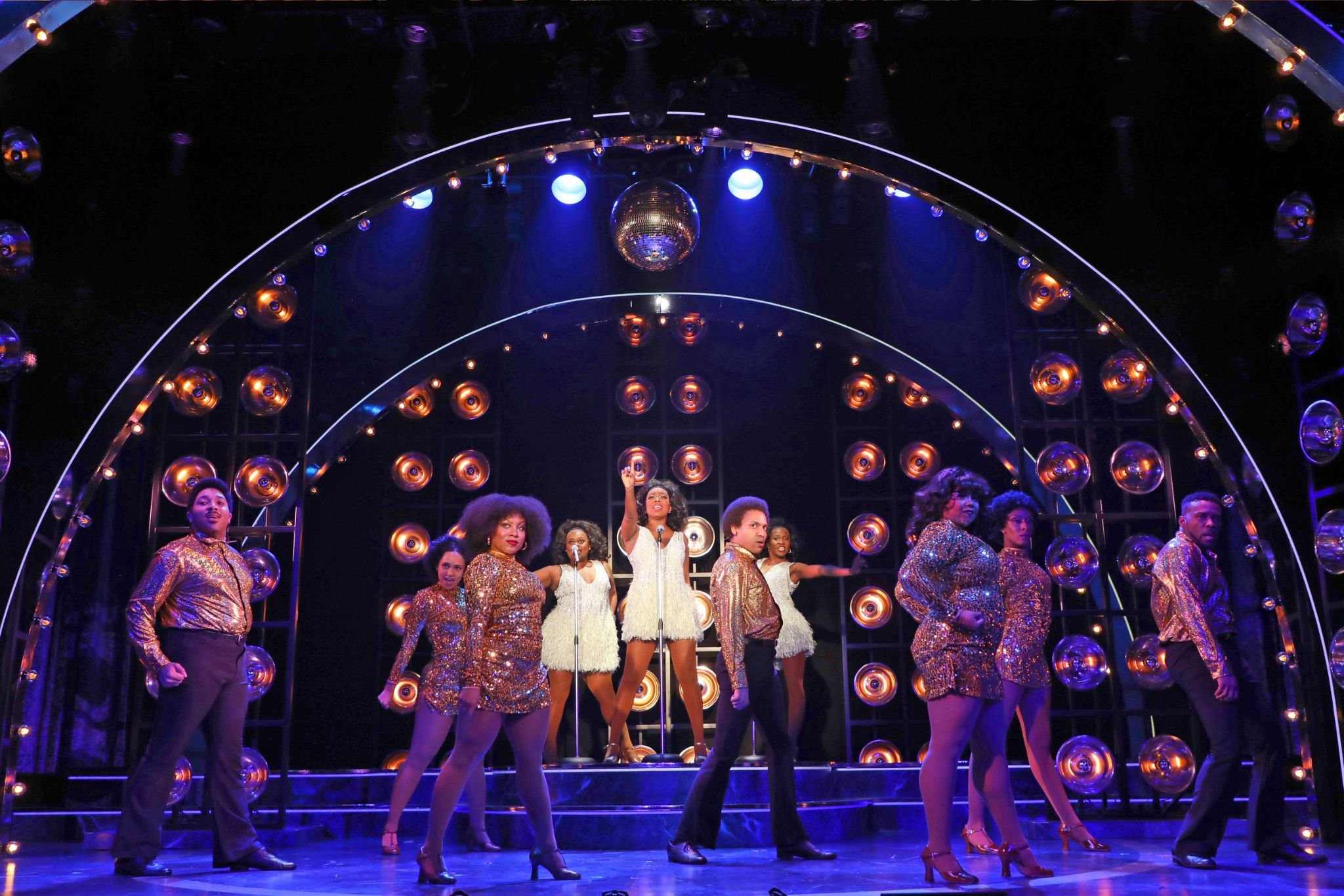Dreamgirls: Harmony, Heartbreak, and Hope
Keirsten Hodgens, Ta-Tynisa Wilson and Shantel Cribbs in Goodspeed's Dreamgirls. Photo by Diane Sobolewski.
On March 16, 2024, 360° of Opera attended the mesmerizing production of Dreamgirls at McCarter Theatre Center in Princeton. This meta-musical delves into the glamorous yet gritty world of show business, exposing the dreams, sacrifices, and harsh realities faced by a Black girl group in the 1960s and 70s.
From the moment the Dreamettes — full-figured lead singer Effie Melody White (played by Trèjah Bostic) and her best friends Deena Jones (played by Ta-Tynisa Wilson) and Lorrell Robinson (played by Keirsten Hodgens) — take the stage at the Apollo Theater’s famous Amateur Night competition, their journey is punctuated by the all-too-real challenges of navigating a male-dominated, often exploitative industry. Under the management of the ambitious Curtis Taylor, Jr. (played by Evan Tyrone Martin), a car salesman turned manager, the trio is thrust into a world where authenticity and artistic expression are sacrificed for mass appeal and commercial success.
Mykal Kilgore with Ta-Tynisa Wilson, Trejah Bostic and Keirsten Hodgens in Goodspeed's Dreamgirls. Photo by Diane Sobolewski.
The visual and musical elements of the production brilliantly underscore the themes of commodification and loss of identity. As the Dreamettes transform into the Dreams, their costumes evolve from simple, ill-fitting dresses to glittering, mass-produced gowns that seem to strip away their individuality. The music, too, reflects this shift, as the raw, soulful sound of early numbers like “Move (You’re Steppin’ on My Heart)” gives way to polished, pop-friendly tunes designed to cater to white audiences, epitomized by the Pat Boone-esque “I Want You Baby.”
At the heart of the story is the power struggle between Effie, the original lead singer with the powerhouse voice, and Deena, who is chosen to replace her due to her slimmer figure and more “marketable” look. This conflict, fueled by Curtis’s manipulation and the societal pressures of the era, highlights the intersectionality of race, gender, and beauty standards in the entertainment industry. As Effie is sidelined, Deena becomes the face of the group, now rebranded as “Deena Jones and the Dreams,” while Lorrell embarks on a tumultuous affair with the married R&B star Jimmy (James Thunder) Early (played by Saint Aubyn).
The cast of Dreamgirls. Photo by Diane Sobolewski.
Dreamgirls is filled with poignant moments that expose the cost of chasing dreams in a ruthless industry. Jimmy Early, despite his talent and charisma, must dilute his style to cross over to white audiences, ultimately leading to his downfall when he rebels against the constraints imposed upon him. Effie, meanwhile, is cast aside for refusing to conform, her defiant ballad “And I Am Telling You I’m Not Going” serving as a powerful cry against the injustice of her dismissal and a plea for love and recognition.
Yet, even as it exposes the darker aspects of the business, Dreamgirls remains a celebration of resilience, sisterhood, and the transformative power of music. CC (Claridge Conrad) White (played by Jos N. Banks), Effie’s brother and the group’s songwriter, emerges as a voice of artistic integrity, fighting against the commercialization of his work. Effie’s triumphant comeback in “I Am Changing” and the Dreams’ final reunion on stage serve as testaments to the strength and perseverance of these women in the face of adversity.
Shantel Cribbs, Ta-Tynisa Wilson, Trejah Bostic and Keirsten Hodgens in Goodspeed's Dreamgirls. Photo by Diane Sobolewski.
The production’s technical elements were equally impressive, with approximately 85 wigs, 150 costumes, and 300,000 glitter panels adding to the visual spectacle. The cast’s dedication was evident throughout, as they navigated quick costume changes with professionalism and grace. The ensemble numbers, such as the electrifying “Steppin’ to the Bad Side” and the haunting “Heavy,” showcased the power of the collective voice, while solo moments like “Walkin’ Down the Strip” and “One Night Only” allowed individual performers to shine.
Photo Credit: Roy Matusek / Courtesy of McCarter Theatre
During the post-show conversation led by McCarter’s Director of University and Artistic Partnerships Debbie Bisno, the actors shared insights into the demanding nature of the show and the importance of representation. Trèjah Bostic, who played Effie, spoke of the emotional resonance of the story and her own journey as a young actor, especially during the challenges of the pandemic. Ta-Tynisa Wilson, who played Deena, discussed the complexities of her character’s arc and the significance of sisterhood in the production.
The other cast members shared their own experiences and advice for aspiring performers. The dance captain encouraged young people to seize every opportunity and study as much as possible, while Ta-Tynisa Wilson emphasized the importance of versatility and adaptability in the evolving landscape of theater auditions. Jos N. Banks, who portrayed C.C., spoke about the show’s themes of personal evolution and the importance of finding community and exploring diverse creative interests.
Photo Credit: Roy Matusek / Courtesy of McCarter Theatre
As the curtain fell on Dreamgirls, I found myself reflecting on the show’s timeless themes that resonate now more than ever. In an era where the pursuit of success and the pressure to conform can be all-consuming, the Dreams’ journey serves as a powerful reminder to stay true to ourselves and lift each other up. Amidst the glitz and glamor, In a world that often feels divided, Dreamgirls invites us to dream fearlessly, love fiercely, and fight for what we believe in. As I left the theater, I felt inspired to approach life with the same passion, authenticity, and resilience as the indomitable Dreamgirls — a testament to the enduring strength of the human experience and the importance of standing together in the face of challenges.
- written by Chloe Yutong Yang.







